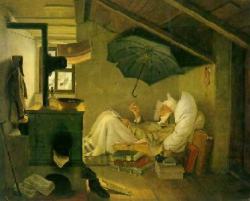
The British skiffle craze began when Lonnie Donegan recorded "Rock Island Line" on 13th July 1954. Here's the gospel according to Billy Bragg.
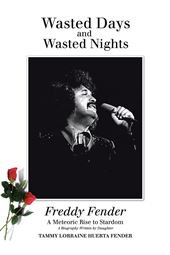 Born Baldemar Garza Huerta (1937–2006) in San Benito TX in the Rio Grande Valley, American-Mexican singer
Freddy Fender wrote and recorded the blues ballad "Wasted Days and Wasted Nights" (It is about how wrongly
I invested in a love affair) in 1959, an overnight hit ... selling like hotcakes in the Southern region.
He was about perfecting a blend of Rockabilly and Tejano music, before that known as Spanish singing El Bebop Kid,
but unfortunatly he was arrested on possession of marijuana and spent nearly three years in the Angola prison farm.
In 1975, Fender re-recorded the song in a swamp pop ballad arrangement and it became a major hit on
both country and pop music charts. It was the begin of an artistic career conquering the customary barriers and
borders of the music business of the time:
The type of country music I like is like rock and country. I don't care how much rock 'n' roll you put into the country song.
You know by their voice it's still country. The music and technique keep changing, but the roots of the tree are still on the
ground and still thriving. As long as the music is good - take off with it, man!
Born Baldemar Garza Huerta (1937–2006) in San Benito TX in the Rio Grande Valley, American-Mexican singer
Freddy Fender wrote and recorded the blues ballad "Wasted Days and Wasted Nights" (It is about how wrongly
I invested in a love affair) in 1959, an overnight hit ... selling like hotcakes in the Southern region.
He was about perfecting a blend of Rockabilly and Tejano music, before that known as Spanish singing El Bebop Kid,
but unfortunatly he was arrested on possession of marijuana and spent nearly three years in the Angola prison farm.
In 1975, Fender re-recorded the song in a swamp pop ballad arrangement and it became a major hit on
both country and pop music charts. It was the begin of an artistic career conquering the customary barriers and
borders of the music business of the time:
The type of country music I like is like rock and country. I don't care how much rock 'n' roll you put into the country song.
You know by their voice it's still country. The music and technique keep changing, but the roots of the tree are still on the
ground and still thriving. As long as the music is good - take off with it, man!
Fender didn't manage to write his life story himself. His daughter Tammy Lorraine Huerta
took up the baton (Father must have concluded that living life was much more invigorating and valuable to him than writing about it),
and dedicated her autobiography to a man who had the courage to live life to the fullest, love all people unconditionally,
laugh and sing his blues away; and most importantly, learn to trust in a Higher Power.
Her recollections are genuine and uncompromising, true to Freddy's burning desire:
I do want them to write a real book, none of this lucky, hunky-dory poor-boy from the Rio Grande Valley, and he did really well, that they could root for and all that.
No, I want the dark side, the bad things - about cocaine and the heroin shooting in my veins with the bad stuff of drug penitentiary, divorcing my wife, and why and
all that! I want things written that were significant in my life!
Wasted Days and Wasted Nights is the first of a two-part autobiography, covering Freddy Fender's rise to stardom until 1979.
Later, the Tejano superstar would struggle with alcohol and drugs and seek spiritual redemption.
He also went on to form the Grammy-winning supergroups Texas Tornados (ft. Doug Sahm, Flaco Jiménez, Augie Meyers)
and Los Super Seven (ft. David Hidalgo, Cesar Rosas, Flaco Jiménez, Ruben Ramos, Joe Ely, Rick Trevino).
In 2001, Fender made his final recording, a collection of Mexican boleros that brought him a third Grammy award.
[Walkin' Tom]
Tammy Lorraine Huerta Fender, Wasted Days and Wasted Nights: A Meteoric Rise to Stardom.
Xlibris Corp, 2017, ISBN 978-1-4568-5105-7, pp416, US$34.99
![]() www.freddyfender.com
www.freddyfender.com
www.tammyhuerta.com
 A prolific composer over thirty years or so, accordionist Paddy O'Brien from County Tipperary has become an icon for box players in particular and a source of great tunes for many Irish musicians. Paddy passed away in 1991, leaving a legacy of 139 tunes which his daughter Eileen has published in several forms: there was a previous Definitive Collection, now long out of print, so this new soft-bound version will be welcome for all those too slow or too young to acquire that hard-bound publication.
A prolific composer over thirty years or so, accordionist Paddy O'Brien from County Tipperary has become an icon for box players in particular and a source of great tunes for many Irish musicians. Paddy passed away in 1991, leaving a legacy of 139 tunes which his daughter Eileen has published in several forms: there was a previous Definitive Collection, now long out of print, so this new soft-bound version will be welcome for all those too slow or too young to acquire that hard-bound publication.
This edition comes with recordings of all the tunes on 3 CDs, played by Eileen on fiddle at around half speed, specifically for learning. If you're not familiar with Paddy O'Brien's music, I can tell you that some of it is quite complex, and it has a particular cadence which is subtly different from most Irish music. Not as different as the compositions of Paddy Fahy perhaps, but distinctive nonetheless, using the chromatic possibilities of the B/C accordion in ways which were ground-breaking at the time. A better comparison might be Finbarr Dwyer's tunes, although O'Brien doesn't have the Munster twang of the Dwyer family.
The tunes here are arranged by rhythm, and many of them are well known from sessions or recordings. Double jigs include Fogarty's Kate, The One that was Lost, The Fox in the Meadow, The Centenary Jig and the tragic Fly in the Porter. Single jigs, slip jigs, marches and polkas are represented in small numbers, and there are more than a score of hornpipes, but reels claim the lion's share of Paddy's output: well known ones include Bubbling Wine, The Four Leafed Shamrock, Larkin's Beehives, The Nervous Man, Hanly's Tweed, Into the Woods, and Ormond Sound which is the first Paddy O'Brien tune I remember hearing. There's also a reel called The Holly Bush which is very unlike Finbarr Dwyer's but just as catchy.
Most of these compositions are in G or D major or related minor keys, so will suit any Irish traditional instrument: some are in flat keys, or have no key signature. Each tune is clearly typeset on a large open stave. No chords or other accompaniments are sugested: this is purely the melody, with some ornamentation marked. Eileen O'Brien has added notes to many of the tunes, some historical, others very personal as her father became ill and needed her assistance to transcribe his later compositions. As well as being a valuable reference book, The Compositions of Paddy O'Brien is a fine resource for musicians to work through and find new material. It will probably become more widely available, but for now it may be easiest to find at the Custy's website.
[Alex Monaghan]
Eileen O'Brien, The Compositions of Paddy O'Brien 1922-1991 - Compiled, Edited and Recorded by Eileen O'Brien.
2017, pp64, €35 (www.custysmusic.com)
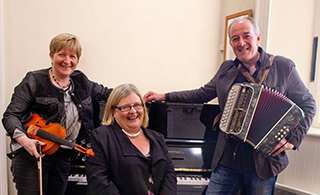
![]()
www.paddyobrienbook.com

Way back in 1854, the Chicago & Rock Island Railroad was openend, a 181-mile route from Chicago to Rock Island on the Mississippi. (Ironically its steel rails had been forged in England.) In the 1920s, the company encouraged its employees to boost the Rock Island brand and write songs to promote the railroad. Engine wiper Clarence Wilson of the Little Rock freight yard composed "Buy Your Ticket Over Rock Island Lines".
In 1934, a convicted burglar at Cummins State Farm, named Kelly Pace, came before John Lomax's recording machine and he and his fellow convicts sang "Rock Island Line" in a call-and-response style. By then the song had been transformed into a tune offering redemption from sin.
Lomax's companion, blues and ballad singer Huddie 'Lead Belly' Ledbetter, put it into his repertoire. With just two verses it felt a little short, so Lead Belly made up a few extra verses borrowing from children's nursery rhymes and the blues tradition.
British seaman and jazz trumpet player Ken Colyer heard Lead Belly sing it and brought it to England. Tony 'Lonnie' Donegan, guitar and banjo player of Chris Barber's New Orleans Jazz Band, began to attract an audience with his enthusiastic solo performances of American folk songs. In 1955, he recorded "Rock Island Line" and released it as a single.
"Rock Island Line" went into the Top Ten. By the way, Lonnie Donegan was the first British artist to get into the charts singing and playing a guitar. Before that the charts were dominated by a mixture of sugary novelty songs, ersatz pop and white-bread rhythm and blues.
It also entered the US charts spawning countless copycat versions, e.g. from Johnny Cash. Lonnie also inspired the first few steps of Art Garfunkel, Phil Spector and Buddy Holly who incorporated it in their sets.
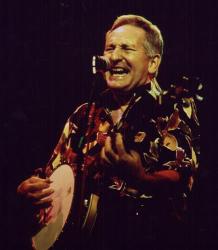
Now, the Rock Island line is a railroad line And it runs down into New Orleasn And just outside of New Orleans is a big toll gate And all the trains that go through the toll gate Why, they gotta pay the man some money Less of course, they got certain things on board Then they okay, then they don't ever Have to pay the man nothin' And right now, we see a train She's comin' on down the line And when she got up here to the toll gate The depot, he shout down to the driver He want to know what he got on board So he say, what you got on board there, boy And the driver, he sing right on back Down to the depot agent Tell him what he got on board They got a way of singing
I got sheep, I got cows I got horses, I got pigs I got all livestock And the man say, well, he say Your alright there, boy You don't have to pay me nothin' Just get 'em on through So the train go through the toll gate And as it go through It got up a little bit of steam And a little bit of speed And when he sees me On the other side of the toll gate The driver shout back Down the line to the man 'Course you don't hear what he say now But home down the Rock Island line I fooled you, I fooled you I got pig iron, I got pig iron I got all pig iron Rock Island line is the road to ride She's a mighty good road
Bill Colyer (brother of the aforementioned Ken Colyer) christened this music as Skiffle, originally black American slang for a house party, now describing guitar-led, roots-based music. From now on, you didn't have to be a trained musician to play an instrument and not everything cool in popular culture had to come from America.
Skiffle was a do-it-yourself music and the first music for teenagers by teenagers.
It is estimated that there were between 30,000 and 50,000 skiffle groups at the height of the craze in 1957.
Folk singer-songwriter Leon Rosselson, who was a member of several skiffle groups, recalls
Folk musicians such as Ewan MacColl, Roy Harper and Bert Jansch jumped on the bandwagon. Norma Waterson formed a The Mariners skiffle group with siblings Mike and Lal and five-string banjo player Pete Ogley. After he left, they turned to 19th century folk song collections renaming themselves the Folksons and singing in their own accents.
Before skiffle there was jazz. Skiffle became boot camp for the British Invasion of the US charts in the 1960: Dave Davies (Kinks), Graham Nash, Roger Daltrey (The Who), Jack Bruce (Cream), Jimmy Page (Led Zeppelin), Marc Bolan (T-Rex), Rod Stewart and Ronnie Wood (Small Faces), Alexis Korner founded (Blues Incorporated), the brothers Gibb (Bee Gees), Van Morrison (Them) all began in skiffle groups.
Keith Richards joined Mick Jagger's skiffle group taking it in the direction of R&B. John Lennon, Paul McCartney and George Harrison started out as the Quarrymen Skiffle Group before heading to Hamburg under the moniker of Long John and the Silver Beetles ...
Roots, Radicals and Rockers is dedicated to every kid who picked up a guitar after hearing Lonnie Donegan. Singer-songwriter-activist Billy Bragg shows that this short-lived British phenomenon had been a pivotal moment in musical history.
Billy (born in 1957) had been raised on 60s pop music, immersed himself in punk rock music, but came to see (traditional) jazz as a back to basics movement. He set some of Woody Guthrie's unrecorded lyrics to music and had joined The Imagined Village, who recorded an album of updated versions of traditional English songs and dances.
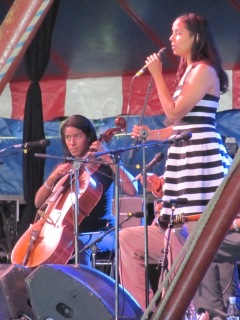
A couple of years ago, he played the Tønder Folk Festival in Denmark:
Just a month later he heard the Americana Music Association defining their genre as:
Billy was taken with the idea that the Brits had invented Americana. So he relates the story of skiffle, jazz, rock'n'roll and the (second) folk music revival, as well as the new post-war phenomenon of youth culture. It is well-reasearched but casual and entertaining.


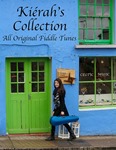 American-born, Galway-based flutist Steph Geremia's latest album, Up She Flew, [66]
is accompanied by a comprehensive companion tune book.
It includes the 34 tunes from the album notated with ornamentation,
variation plus information about the musicians and specific regions from where the tune versions come from.
American-born, Galway-based flutist Steph Geremia's latest album, Up She Flew, [66]
is accompanied by a comprehensive companion tune book.
It includes the 34 tunes from the album notated with ornamentation,
variation plus information about the musicians and specific regions from where the tune versions come from.
Empress of Ireland is named after the ship that brought Kiérah Raymond 's great grandparents to Canada in 1906,
other tunes are named for supportive businesses and benefactors in her community in British Columbia.
Over the course of four albums, [64]
fiddler Kiérah Raymond has recorded 66 original tunes. All of these jigs, reels, strathspeys, waltzes and slow airs
are included in her tune book, Kiérah's Collection, some in challenging keys such as D minor, E flat, F and F#.

![]() Steph Geremia @ FROG
Steph Geremia @ FROG
www.stephgeremia.com
![]() Kiérah @ FROG
Kiérah @ FROG
www.irishmadness.com
Photo Credits:
(1ff) Book/CD Covers,
(6) Lonnie Donegan,
(7) Boruma Trio,
(10) Steph Geremia,
(11) Kiérah
(from website/author/publishers);
(8) Carolina Chocolate Drops (Tønder Festival 2013),
(9) Billy Bragg (Tønder Festival 2013)
(by Walkin' Tom).